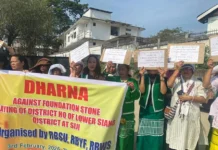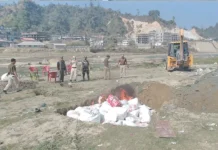ITANAGAR, 17 May: The Human Rights Law Network (HRLWN) has urged the state government to reassess the application of the Arunachal Pradesh Unlawful Activities (Prevention) Act, 2014 (APUAPA) and address its concerning provisions.
Condemning the application of the Act by the district magistrate (DM) during the recent bandh, the human rights organization stated that the act bears striking similarities to the draconian law, the Unlawful Activities (Prevention) Act 1967 (UAPA), which has a troubling history rooted in colonial India and the suppression of freedom fighters.
“While the UAPA 1967 was initially introduced with the intention to combat terrorism and unlawful activities that pose a threat to the country, it has often been misused by the government to stifle dissent and target activists, journalists and other individuals exercising their fundamental rights,” HRLWN said in press release on Wednesday.
It said that the Act grants unchecked power to the government, allowing for the arbitrary detention of any person involved, and thereby curtails the fundamental rights enshrined in the Constitution of India, particularly those outlined in Article 22, which provides protection against arbitrary arrest and detention.
The Arunachal Pradesh UAPA 2014 follows a similar pattern, providing the DM with unrestricted power to detain any person for up to 12 days, with the possibility of extended detention upon approval by the state government, as stated in Section 3(2) of the APUAPA, the organization said.
“While every case of detention is presented before an Advisory Board consisting of retired High Court Judges recommended by the Chief Justice of India and not less than two members appointed by the State Government, Section 10(4) prohibits legal practitioners from appearing on behalf of the detained person in any matter connected to the reference made to the Advisory Board,” it said.
The organization further said, “It is evident that the provisions outlined in the APUAPA leave room for abuse and manipulation by the state government, enabling them to target individuals without proper safeguards or legal representation. We already possess a sufficient array of laws and acts
to effectively apprehend and prosecute offenders, with ample room for judicial intervention, thereby negating the need for granting excessive powers to the state government.”
It also urged the district magistrate and the state government to treat every offender equally not just picking on people who are not politically backed or weak citizens.
The organization said that there was a bandh declared by an association (All Nyishi Youth Association) last year, where the executive members of the association were detained and then released with fair warning, while the poor students and citizens were arrested and booked under several non-bailable sections.
“Why were these poor students not given fair warning, why such disparity? Is the law only for the weaker citizens,” it questioned.
The organization appealed to the intellectuals of state to condemn and discourage the use of such draconian laws.
“Let us stand united in safeguarding the fundamental rights of all citizens and maintaining the democratic principles upon which our nation is built,” the HRLWN added.



